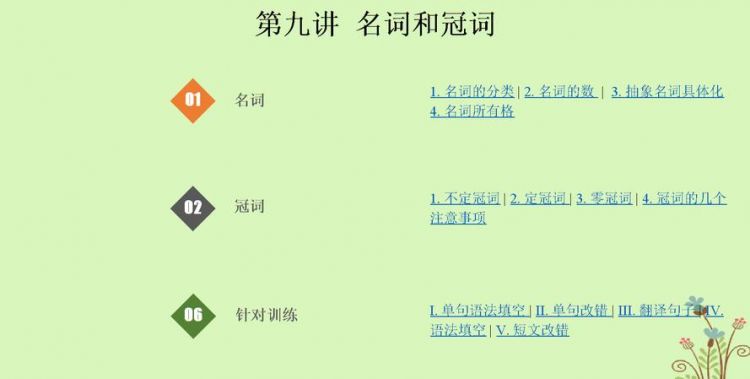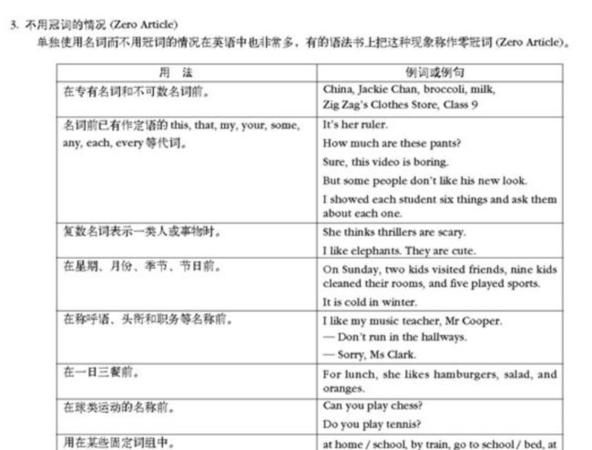本文目录
英语高考重点语法有哪些
1.名词与冠词:主要是 有些名词前的冠词运用
2.语法:被动语态,强调句型,倒装,定语从句,虚拟语气,
(而这些句型中更专注于考 它们的时态变换,例如一个动词的形式,是过去还是过去完成,还是一般现在时态。。。。。。。。。。。。。。。。。。。。。。。。。。。。。。。。。

高考英语名词知识点总结
名词(英文Noun,简称n.),是词类的一种,属于实词。它表示人、事、物、地点或抽象概念的统一名称。它分为专有名词和普通名词。下面我给大家分享一些高考英语名词的知识,希望能够帮助大家,欢迎阅读!
高考英语名词的知识1
名词所有格
1.-’s所有格
①用and连接的并列名词的所有格要分两种情况,即表示各自的所有关系时,要分别在并列名词后加-’s 或’;表示共同的所有关系时,只在最后一个名词后加-’s或’。
Tom’s and Jim’s rooms.汤姆和吉姆(各自)的房间。
Tom and Jim’s room.汤姆和吉姆(共同)的房间。
②表示店铺、办公室或某人的家时,名词所有格后被修饰的名词一般省略。
at the barber’s在理发店
at the teacher’s在老师办公室
2.of所有格
表示无生命的事物的名词通常用of所有格表示所有关系;名词 短语 或有定语修饰的有生命的名词也常用of所有格。
the content of the novel小说的内容
the name of the girl over there那边那位女孩的名字
3.双重所有格
指"名词+of+名词所有格"或"名词+of+名词性物主代词"。
a play of Shakespeare’s(莎士比亚的一个戏剧)
a friend of mine(我的一个朋友)
高考英语名词的知识2
名词的语法功能
1.作主语
The young woman played an important part in the matter. 那年轻女人在这件事上举足轻重。
His grandpa joined the Red Army at the age of fifteen. 他爷爷十五岁时参加红军。
2.作宾语
(1)作及物动词的直接宾语
I met your elder brother in the street。我在街上碰见你哥哥了。
Have you finished the letter to Jane?你写完给珍的信了吗?
(2)作及物动词的间接宾语。
I told my students a funny story. 我给学生们讲一个有趣的 故事 。
She asked the doctor another question. 她问了医生另一个问题。
(3)作介词的宾语。
After 20 years’ traveling, he settled down in Liangxiang. 二十年的流浪后,他在良乡定居。
Do you still ask your parents for money?你还向爸妈要钱吗?
3.作表语
It’s a good idea to plant trees here . 在这里栽些树是个好主意。
She is now a professor while her husband remains a worker. 也现在是教授而丈夫仍是个工人。
4.作宾语的补足语
They elected Tom head of the workshop. 他们推选汤姆当车间的头。(职务名词作宾补前面不加冠词)
The old man called my uncle Xiao Li. 老人喊我叔叔小李。
5.作定语
(1)直接作定语, 通常用单数形式。
college students大学生 girl friend女友 vegetable garden菜园 basketball match 篮球 赛
Let’s stop by the book store on the way home.回家的路上,我们的书店停一下吧!
He bought the shoes in that shoe shop. 这双鞋他是在那个鞋店买的。
(2)名词所有格作定语。
students’ books学生用书
China’s capital中国的首都
the world’s population世界人口
(3)man,woman,gentleman作定语
man,woman,gentleman作定语时可以用单数和复数两种形式,但必须随所修饰名词的数而定。
He said that two women doctors would come to our village the next day. 他说明天有两个女医生到我们村子来。
There are many men teachers in our school. 我们学校有很多男教师。
(4)某些常用复数的名词用作定语
某些常用复数的名词,当它们用作定语时,也须用复数形式。
arms production 武器生产 clothes shop服装商店 sales department营业部 a goods train货车
savings bank 储蓄所 foreign languages department外语系
(5)单位名称、报纸、广播、电视等的标题中经常出现复数名词作定语。
Learning Skills center学习技巧交流中心 The Boys Club 男孩俱乐部
(6)表示类别时名词直接作定语还是用所有格作定语一定要严格遵守习惯。
a peasant family/boy(peasant习惯直接作定语) a worker’s family(worker习惯用所有格作定语)
(7)两种定语有时并存但意义不一样。
women drivers女司机 the woman’s driver这位妇女的司机
girl friend女朋友 the girl’s friend 这女孩的朋友
mother tongue母语 mother’s tongue母亲的舌头
(8)名词作定语强调被修饰成分的内容或职能,与其同根的形容词作定语则强调特点或属性
gold watch 金表 (指手表是含金的) golden watch 金色的表 (指表是金色的,但不一定含金)
6.作状语
时间名词、数量名词、距离名词等有时可以作状语。
The soldiers walked 50 kilometers at a night. 战士们一夜行军五十公里
Your suitcase weighs 10 kilograms. 你的手提箱重10千克。
高考英语名词的知识3
疑难名词比较与辨析
1.force; energy; strength; power
force表示"力、力量"的意思。指为做或实现某事而实际运用的力量。
He overcame his bad habits by force of will.毅力使他克服了自己身上的不良习惯。
Those people are the progressive forces in the society. 这些人是社会的进步力量。
energy主要强调"精力",指用来做某事或完成某事的能力。还可以指"能源"。
Young people usually have more energy than the old. 青年人通常此老年人精力充沛。
Many countries are increasing their use of natural gas, wind and other forms of energy. 很多国家正在提高天然气、风以及其他能源形式的利用。
strength表示"力"的意思。指做事情的--种内在能力。就人而育,着重指力气;就物而言,着重指强度潜力等。
He lifted the stone with all his strength.他使出全身力气举起了那块石头。
The side man hasn’t got enough strength to get out of bed. 那位病人还没有足够的力气下床。
power 表示 "能力、能量、动力"的意思。指身体上、心理上和道德上的能力(不管是否发挥出)。
Knowledge is power.知识就是力 量。
I shall do everything in my power to help you.我将尽我的能力帮助你。
2.manner; means; method; way
manner表示"方式、 方法 "的意思。指个人喜欢采用的方式。
The manner of their meeting makes a good story. 他们相见的方式似乎有些传奇色彩。
He has developed his own manner of acting. 它形成了自己独特的演出风格。
means表示"方法、手段 、工具"的意思。
Students sometimes support themselves by means of evening job. 学生有时通过晚上打工的方法来养活自己。
The quickest means of travel is by plane.最快的旅行工具是飞机。
Have you the means to support a family? 你有维持家的方法没有?
method指做某事的具体步骤或程序,也指系统的、抽象概念的原理。
His idea is all right, but he lacks method.他的想法不错,但是缺少方法。
He is a man of method.他是个有条理的人。
method of teaching 教学方法 method of study 学习方法
Roasting is one method of cooking meat. 烤是做肉的一种方法。
way是最通用的词,也是最不正式的词,本义是"通道、通路",引申作"方式、方法"讲,含义很广。
In this way over several days, the artist and his mice became friends. 就这样过了几天,这位艺术家和他的老鼠成了好朋友。
Look ! Work on it in this way. 看!像这样搞它。
My parents always let me have my own way of living.
3.cost; price; value; worth; expense
cost表示"成本、费用"的意思。原指生产某种物品的成本 ,包括生产中所支付的原料和劳动。一般要低于售价,有时也可用来泛指价格。也可用于借喻,指所付出的代价,甚至生命。
As a result, costs will be reduced by as much as 90%. 因此,成本将会降低90% 之多。
China Daily has plenty of advertisements, which help to cut the costs of making the newspaper. 《中国日报》刊登大量 广告 有助于降低报纸生产的成本。
price表示"价格、价钱、定价"的意思。指经营商品出售的单价,通常要高于商品的出厂成本。也用于借喻,指做某事所付出的代价。
Can you try to get them to bring down the price? 你能把价格讲下来吗?
They can sell their beef at a high price in the capital. 他们可以在首都以高价出售他们的牛肉。
value表示"价值、价格"。指我们所估计一件东西的价值,因此是不能 以金钱估价的。
Instead, they are writing once more about things that are common for everyone: feeling alone in the modern world, the value of having good friends and so on. 他们现在再一次写常人常事——现代世界中的孤独感及交好朋友的价值等等。
The park is good value for the money.公园花这么多钱值得。
worth意思是价值。指东西本身的真正价值,是经久不变的,是可贵的。
It was worth five hundred francs at the most.它最多值500法郎。
He asked me how much this computer was worth. 他问我这台计算机值多少钱。
expense意思是"费用、支出、开销",指花费金钱、时间和精力。
We travelled to France at our own expense. 我们自费去法国旅行了。
Do you know at whose expense your visit to Japan will be?你 知道谁将担负你访问日本的费用吗?
4.land; ground; soil; earth
land表示"陆地、土地、地",是河流和海洋的相对用语。用于指土地或土壤时,着重指它的性质、用途等。有时泛指大地,也可作"国家、地产"讲。
The rocky soil has been turned into rich land.岩石地已变成了沃土。
But some people don’t want good farm land to be built on. 但是有些人不愿意把好的农田用来修建厂房。
To the sea captain’s surprise, he found that land travel could also be quite pleasant. 使那位船长吃惊的是,他发现陆地旅行也很愉快。
ground(n. )表示"地、土地"的意思。主要指大地表面,也可以指土壤、场地。也可用于借喻指"根据、理由"。
He learnt how to clean rough ground before planting crops. 他学会了在 种植 作物之前如何拾掇毛糙的土地。
Then the Class 2 runner dropped his stick on the ground when he was passing it on to the fourth runner.然而,当二班运动员传给第四棒时,接力棒掉在地上了。
soil表示"土壤、土地",指可以生长植物且富有有机物的沃土,宜于农耕。
When the plants are in the ground, I’ll put some powder on the soil.当植物种到地里时,我将给地里撒些粉剂。
He studied how to improve soil conditions.他研究如何改善土壤环境。
earth表示"地、地球、泥土",着重指"大地",以别于天空。作"泥土"解时,常用于以别于坚硬的岩石。
Later, in a few weeks’ time I’ll put the little plants in the earth. 几星期后,我将把小植物埋在泥土里。
5.practice; exercise; training; drill
practice; exercise; training; drill都表示"练习、训练"的意思。
training表示"训练、培养、教练、锻炼"的意思。一般指对于身体的锻炼、对动物的训练、对士兵的训练等。
These football players had no strict training until they joined our club.这些 足球 队员直到加入我们俱乐部才受到严格的训练。
The athlete is in training.这个运动员锻炼得好。
The home training of children is the first class social problem. 儿童 的 家庭 教育 是社会的头等问题。
exercise主要指为提高技巧或业务水平而规定的"练习或体格锻炼"。
The book contains a series of graded exercises adapted to the use of beginners. 书中有一系列按难易排列的练习适于初学者应用。
You need more outdoor exercise.你需要多进行 户外运动 。
practice主要指正规的、有条理的、不断反复的 "练习"或把理论道理贯彻在行动中的 "实践"。
More practice will make you speak with greater fluency. 多练习会使你口语更流利。
The integration of theory and practice is one of the basic points of Marxism. 理论和实践的统一是马克思主义的基本论点之一。
drill表示"操练、训练"的意思。一般指严格的训练或反反复复练习或军事上的练兵。
Let’s do some pattern drills.咱们做些句型练习吧。
The soldiers were at drill in the barrack yard.士兵们在营场上操练。
6.sign; signal; mark; symbol
sign表示 "符号、记号、招牌"等意思。是最普通的用语,指一个具有公认意义的、简单的、随意制定的代表物。
Letters are signs used to represent sounds.字母是用来代表声音的符号。
You’ll see the sign for the rest rooms.你将看到休息室的指示牌。
signal表示 "暗号、信号"的意思。有时是有意的;有时是无意的。有意的,如强风讯号、求救信号等。
There the electrical signal is changed back into sound. 在那儿电信号又变成声音。
mark表示 "痕迹、记号、商标、特征、分数"的意思。指印在物品上的记号,可用在好坏两个方面。作动词时,表示"标明、作记号"的意思。
He got full marks in his maths test. 他在数学测试中得了满分。
Each stone was marked with a number. 每个石头上都标明号码。
symbol表示 "象征"的意思,特别强调故意用来包含某一特定意义的东西,或故意构成的传达某一特定意义的事物。
a good luck symbol 好运气的象征
The lion is considered the king of the forest as it is a symbol of courage and power. 狮子被看作百兽之王,是因为它是勇气与权利的象征。
高考英语名词的知识点相关 文章 :
★ 高考英语复习知识点:冠词和名词
★ 高考英语知识点考点归纳
★ 高考英语知识点汇总
★ 高考英语必备的知识点总结
★ 高考英语必备的知识点
★ 高考英语必背的知识点
★ 高考英语知识点考点最新归纳
★ 高考英语知识点整理最新
★ 高考英语知识点归纳最新
★ 高考英语语法知识点

冠词的知识点归纳高中
作为一名知识分子,他不应该也不会排斥团队合作和团队精神,但他在团队中有独立的人格和自由的思维。下面我给大家分享一些冠词的知识点,希望能够帮助大家,欢迎阅读!
冠词的知识点1
定冠词的用法
1.特指某(些)人或某(些)物,这是定冠词的基本用法。
The girl under the tree is my sister.
树下的女孩是我妹妹。
2.指谈话双方都知道的人或事物。
Open the window,please.请打开窗户。
3.指上文已经提到的人或事物。
I have a car. The car is red.
我有一辆小汽车,它是红色的。
4.指世界上独一无二的事物。
Which is bigger,the sun or the earth?
哪一个大,太阳还是地球?
5.用在序数词,形容词最高级前。
The first lesson is the easiest one in this book.
第一课是这本书最简单的一课。
6.用在由普通名词构成的专有名词前。
the great wall 长城,the united states美国
7.用在某些形容词前,表示某一类人。
the poor穷人,the blind盲人
8用在姓氏复数形式前,表示“全家人”或“夫妻俩”。
the Greens 格林一家或格林夫妻俩
9.用在方位词前。
on the left在左边,in the middle of在中间
10.用在乐器名称前。
She plays the piano every day.她每天弹钢琴。
11.用在表示海洋,河流,山脉,群岛及国家和党派等名词前。
the black sea黑海,the yangzi river长江
12.用在某些固定词组中
冠词的知识点2
零冠词的用法
1.在专有名词和不可数名词前。
Class two二班,Tian’an men square天安门广场,water水
2.可数名词前已有作定语的物主代词(my,your,his,her等)、指示代词(this/these,that/those)、不定代词(some,any等)及所有格限制时。
my book(正);my the book(误)
3.复数名词表示一类人或事物时。
They are teachers.他们是老师。
Tigers like meat.老虎喜欢吃肉
4.在星期,月份,季节,节日前。
on sunday在周日,in march在三月,in spring在春天,on women’s day在妇女节
(特例:如果月份,季节等被一个限定性定语修饰时,则要加定冠词:he joined the army in the spring of 1982.他在1982年春季参军。)
5.在称呼语或表示头衔的名词前。
Tom汤姆,mum妈妈
6.在学科名称、三餐饭和 球类运动 名称前。
I have lunch at school every day.
特例:当football,basketball指具体的某个球时,其前可以用冠词:i can see a football.我可以看到一只 足球 。where’s the football?那只足球在哪儿?(指足球,并非“球类运动”)
7.在表特定的公园,街道,车站,桥,学校等之前。
No.25 middle school
8.某些固定词组中不用冠词。
(1)与by连用的交通工具名称前:by bus乘公共汽车;by car乘汽车;by bike骑/坐自行车;by train乘火车;by air/plane乘飞机;by sea/ship乘船,但take a bus,in a boat,on the bike前需用冠词
(2)名词词组:day and night日日夜夜;brother and sister兄弟姐妹;hour after hour时时刻刻;here and there到处
(3)介词词组:at home在家;in surprise惊奇地;at noon在中午;on foot步行;at night在晚上;on duty值日;at work在工作;on time准时;for example例如;in class在上课;on show展览;in bed在床上
(4)go 短语 :go home回家;go to bed上床睡觉;go to school去上学;go to work去上班;go shopping/swimming/boating/fishing去买东西/ 游泳 /划船/钓鱼
冠词的知识点3
用与不用冠词的差异
in hospital住院/in the hospital在医院里
go to sea出海/go to the sea去海边
on earth究竟/on the earth在地球上,在世上
in front of在……(外部的)前面/in the front of在……(内部的)前面
take place发生/take the place(of)代替
at table进餐/at the table在桌子旁
by sea乘船/by the sea在海边
in future从今以后,将来/in the future未来
go to school(church…)上学(做礼拜…)/go to the school (church…)到学校(教堂…)去
on horseback骑着马/on the horseback在马背上
two of us我们当中的两人/the two of us我们两人(共计两人)
out of question毫无疑问/out of the question不可能的,办不到的
next year明年/the next year 第二年
a teacher and writer一位教师兼作家(一个人)/a teacher and a writer一位教师和一位作家(两个人)
冠词的知识点英语高中相关 文章 :
★ 高考英语复习知识点:冠词和名词
★ 高考英语语法填空冠词知识点与谓语动词表
★ 高中英语语法知识点整理总结
★ 高考英语知识点考点归纳
★ 高中英语语法知识点整理
★ 英语高中语法介词知识点汇总
★ 高考英语知识点考点最新归纳
★ 英语高中知识点总结
★ 英语高一必修一语法知识点汇总
★ 高中英语语法大全

高中英语冠词知识点归纳
高中英语冠词语法知识点总结
高中常用的冠词有哪些呢?下面由我为大家整理的高中英语冠词语法知识点总结,欢迎大家查看!

冠词
高考对冠词的考查集中在基本用法上,主要既反映在对泛指、特指及固定短语 冠词的考查。抽象名词、物质名词的具体化依然是高考的重点、难点。
一、不定冠词
不定冠词a,an与one同源,表示微弱的一的概念,但并不强调数目,用来表示不确定的人或事物。
A用在辅音前,而不是辅音字母前;an用在元音前,而不是元音字母前。
a university in Asia
1.表示同类中的任何一个
A cat has nine lives.
2.表示泛指的某人、某物
I know a John Lennon,but not the famous one.
3.表示数量的一 He has a daughter.
4. 表示单位数量的每一 I earn 10 dollars an hour.
5.表示相同的
The two birds are of a color.
6. 用于集体名词前
He grows up in a large family.
7. 在某种情况下可用于抽象名词和物质名词前 China has a long history.
二、定冠词的用法
1.表示特定的人或物
2.表示地球、宇宙中独一无二的事物
主要指各种天体及世界上比较有影响的物体。 The sun,the moon,the earth
3.表示地点、方向、时间、方式等 at the corner 在拐角处
1) 在表示季节的名词前常不用冠词。 In spring 在春天
2) 具体某年的某个季节,需用冠词。 In the summer of the year2008
3)用于序数词或形容词的最高级前 the first the second
4)用于形容词前使其名词化 the rich the poor
5)用于复数姓氏前,表示―夫妇‖或全家 The Smiths
6)用于乐器名词前 Play the piano
7)用于by+the+计量单位名词 By the pound
1. 用于复数名词前
复数名词泛指某类人或物时,其前通常用零冠词。 Students should obey the school rules. 学生应该遵守校规。 复数名词若需特指,则要加定冠词。 The students are too lazy. 这些学生太懒。
2. 用于不可数名词前
不可数名词表示泛指时,其前通常用零冠词。如: Bread is made from flour. 面包是用面粉做的。
Wood is a poor conductor of sound. 木头是声音的不良导体。 不可数名词若需特指,则要加定冠词。
He sawed the wood into three pieces. 他把木头锯成三块。
3.用于专有名词前
在通常情况下,专有名词前要用零冠词。如:
Mr Smith is our English teaches us English. 史密斯先生教我们英语。 在特殊情况下,若专有名词需要特指,也可加定冠词。如: The Smith you‘re looking for no longer lives here.
4. 用于抽象化的可数名词前
有些可数名词抽象化后表示表示的活动,其前通常零冠词。 Jim has gone to bed. 吉姆已上床睡觉了。
She goes to church every Sunday. 她每周星期天都去做礼拜。
这类主要涉及bed, church, class, college, school, university, work, hospital, prison, market, sea, town等。另外,这类名词前用不用冠词有时与英美英语的表达习惯有关。如:―住院‖在英国英语中通常说成 in hospital,而在美国英语中则通常说成in the hospital;类似的还有go to university (英)上大学 / go to the university (美)上大学;at table (英)在吃饭 / at the table (美)在吃饭。
5. 用于职务及头衔前
当表示职务及头衔的名词用作表语、补足语及同位语时,其前通常用零冠词。如: Wilson became President of the U. S. A. 威尔逊当了美国总统。 He will be made captain of the football team. 他将被选为足球队队长。
6. 在表示学科、语言、三餐、月份、季节、节假日、星期等名词前,通常用零冠词。 We are all interested in physics. 我们大家都对物理感兴趣。 7. 用于某些固定结构中
go to sea 去当水手 at home 在家 at night 在晚上 at least 至少
at most 至多 at first 首先 at last 最后 in bed 在床上
on foot 步行 face to face 面对面
第二章 代词
高考中对代词的考查主要集中在人称代词(主要是其中的it)、关系代词、指示代词和不定代词上。
一、 it的用法 1.作人称代词
John likes playing Ping pong./ He always does it in the afternoon.(指代上下文提到的事物); /It's time we went home. / How far is it from here to your home ? / It is getting warmer and warmer./ It's very quiet at the moment.(可指时间、天气、环境等) 2.引导词
A.作形式主语,代替由不定式、动名词或从句表示的真正主语。
It's important for us to learn a second language./ It's no use talking to him./ It's known to all that the earth goes round the sun.
B.作形式宾语,代替由不定式、动名词或从句表示的真正宾语。
We feel it our duty to help others./ He made it clear that he would leave the city. C.强调结构:It is (was) +被强调部分+that (或who)…
注意:在强调结构中,如被强调部分为时间状语或地点状语,其后的连接词也绝不能为when 或where,而应用that 。在复习中,一定要注意句式的不同。 It was in Shanghai that I bought the guitar.(that引起强调句) It was Shanghai where I bought the guitar.(where引起定从)
It was twelve o'clock when we arrived there.(when引起时间状语从句) It was at twelve o'clock that we arrived there.(that 引起强调句)
3. it,one,that 的区别:作为代词,这三个词的对比使用是高考的热点之一。 —Why don't we take a little break? —Didn't we just have __________? A.it B.that C.one D.this
The Parkers bought a new house but _________will need a lot of work before they can move in. A.they B.it C.one D.which
one 用以指代同类事物中的任一,that 特指性强,指代可数与不可数词,而it指代上文提过的同一事物。
二、 关系代词
who,whose,whom,which,that,as
1)which可以引导非限定性定语从句,代表前面整个句子的内容,并且在从句中做主语 2)that的用法 1)不用that的.情况
a) 在引导非限定性定语从句时。 b) 介词后不能用。
We depend on the land from which we get our food. We depend on the land that/which we get our food from.
2) 只能用that作为定语从句的关系代词的情况 a) 在there be 句型中,只用that,不用which。
b) 在不定代词,如:anything, nothing, the one, all, much, few, any, little等作先行词时,只用that,不用which。
c) 先行词有the only, the very修饰时,只用that。 d) 先行词为序数词、数词、形容词最高级时,只用that。. e) 先行词既有人,又有物时。
举例:
All that is needed is a supply of oil. 所需的只是供油问题。
Finally, the thief handed everything that he had stolen to the police. 那贼最终把偷的全部东西交给了警察。
3) as的用法
AS作关系代词,用来引导定语从句:限制性定语从句和限非制性定语从句 一、AS引导限制性定语从句
AS引导限制性定语从句时,通常和such, the same, as(so)等连用,构成such...as/such as, the same...as/the same as, as(so)...as等结构,在从句中可作主语,宾语和表语。
1.such...as/such as意为―...的那种...,像那样的‖,such...as/such as引导限制性定语从句时,既可指人,也可指物。such用于名词之前时,具有形容词性质;such单独使用(即后面不接名词)时,具有代词性质。
Don‘t trust such men as praise you to your face.(as作主语) 不要相信那种当面吹捧你的人。
You should read only such books as you can understand without much difficulty.(as作宾语) 你应当只读那些你读起来不太难懂的书。
Associate with such as will improve your manners.(as作主语) 要和能改善你的言行的那种人结交。
2.the same...as/the same as意为―与...同样的‖,和such一样,the same既有形容词作用,又有代词性质。
We have arrived at the same conclusion as they have.(as作宾语) 我们已得出和他们同样的结论。
比较:the same...as和the same...that不同,前者是―同那一个相似‖,后者是―正是那一个‖。如:
This is the same watch as I lost. 这同我丢的那块表一样。
This is the same watch that I lost? 这正是我丢的那块表。
3.as(so)...as意为―和...一样‖,后接由many, much等修饰的名词或由形容词修饰的单数名词,注意其语序为as(so)+adj.+a+n+as,如: It‘s as pleasant a film as I have ever seen. 这是一部和我以往看的同样好的电影。
As many soldiers as marched were killed. 很多游行的战士都被杀了。
注意:such ...as与such...that ,so...as与 so...that的区别: that是连词,引出结果状语从句,在从句部分不作成分;as是关系代词,引出定语从句,在从句中可作主语,宾语和表语。比较: He is such a nice boy that everyone likes him. He is such a nice boy as everyone likes.
It is so difficult a problem that nobody can work it out. It is so difficult a problem as nobody can workout.
二、AS引导非限制性定语从句
AS引导非限制性定语从句时,通常指的不是主句中的某一个名词(先行词),而是指整个主句表达的内容,对主句所作的陈述进行附加说明,意为―这...,如...或正如...‖。这种从句可位于主句之前,之中或之后。
As we all know, Taiwan belongs to China. Taiwan, as we all know, belongs to China. Taiwan belongs to China, as we all know. 注意下面的习惯用法:
as is well discussed 正如已讨论过的
as is often said 正如通常所说 as is often the case 通常就是这样 as has been pointed 正如所指出的那样 as has been said before 如上所述 as often happens 如同经常所发生的那样 as might be expected正如所料 as is well known to all众所周知
在多数情况下,从句中的谓语助动词可以省略 as explained before 如前面所解释的 as mentioned above 如前面所提到的 as shown in the figure 如图所示 as seen from the table 从表中可以看出 as already discussed 正如已讨论过的 三、不定代词
一) . some 与 any 的用法
I have some questions about the assignment. (希望得到肯定答复)。
2. any 用于否定句和疑问句时,表示一些。用于肯定句时,只和单数名词或不可数名词连用,表示任何。如:
The medicine is on sale every where. You can get it at any chemist‗s. 二) . each 与 every 的用法
1. each 强调个体,表示两个或两个以上中的每一个,在句中可充当主语、宾语、定语和同位语。如:
There are trees and flowers at each side of the road.
2. every 强调整体,表示三者或三者以上中的每一个,只能作定语,不能说 every of them ,要说 every one of them .
Every student in our class works hard. 三 . no one 与 none 的用法
1. no one 意为没有人,只能指人,不能指物,不可与介词 of 连用,谓语动词用单数形式,回答 who 引导的问句。如: Who is in the classroom? No one.
2. none 既可指人,也可指物,强调数量,意为一点也不,一个也不;谓语动词既可用单数也可用复数;常与 of 连用,通常指三者以上的人或物中没有一个,回答 how much 和 how many 引导的问句。如:
They were all tired, but none of them would stop to have a rest. 四 . other, another, others, any other, the other 的用法
1. other 表示泛指,意为另外的、其它的。常与复数名词或不可数名词连用。如果其前有 the, this, some, any, each, every, no, one 以及形容词性物主代词时,其后就可接单数名词。如: I have no other place to go.
2. another 常用于指三者或三者以上中的另外一个,泛指单数。可单独使用,也可后接名词。如果其后接复数名词,则表示又、再、还。如: This cap is too small for me. Show me another (one)。 We need another three assistants in our shop.
3. others :它是 other 的复数形式,表示泛指,意为别的人或物,但不指全部。特指时在其前加定冠词;前面可加任何限定词以及数量词。如: He has more concern for others than for himself.
4. any other 表示一个之外的其他任何一个,而不是两个之中的另一个。如: China is larger than any other country in Asia.
5. the other :表示两者中的另外一个。可单独使用,也可接单数名词。如: No agreement was reached in the discussion as neither side would give way to the other. 五 . all 与 both 的用法 均表示都,但 all 表示三者以上的人或物, both 则表示两个人或物。二者都表示肯定意义,如果与 not 连用时,则表示部分否定。 六 . neither 与 either 的用法 都可用于表示两个人或物。 neither 表否定意义,意为(两者中的每一个)都不;而 either 表肯定意义,意为(两者中的每一个)都。都可单独使用,也可同介词 of 连用。如: Both teams were in hard training; neither willing to lose the game. Do you want tea or coffee? Either. I really don't mind.
以上就是关于高考名词和冠词考点,英语高考重点语法有哪些的全部内容,以及高考名词和冠词考点 的相关内容,希望能够帮到您。

